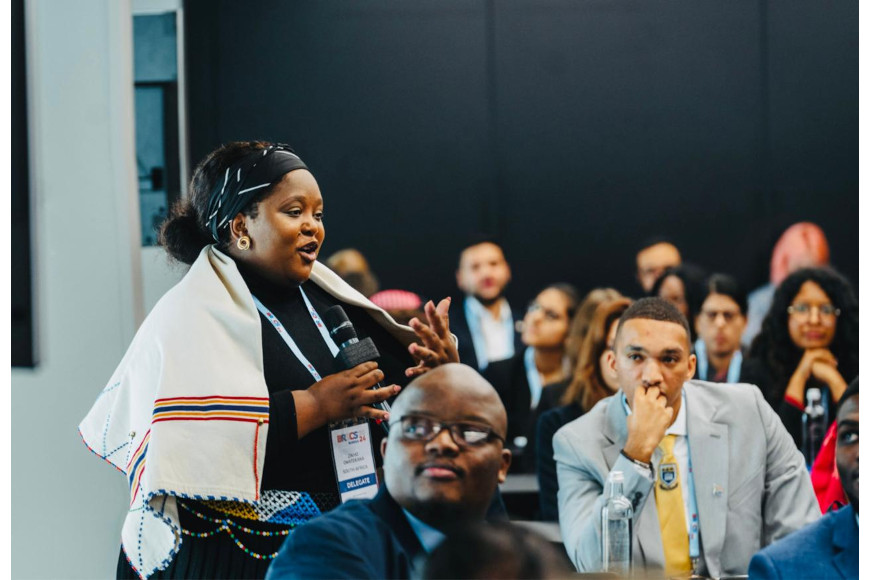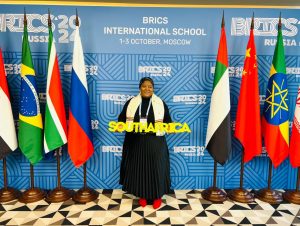Ms Zikho Qwatekana, a lecturer in the Department of Ecotourism at the Durban University of Technology (DUT), recently seized a once-in-a-lifetime opportunity to represent South Africa at the 8th Annual BRICS Expert Council International School in Moscow, Russia.
Passionate about sustainability, community development through tourism and governance, Qwatekana is pursuing her PhD in Ecotourism and Environmental Management at DUT. Her research aims to push boundaries and make a significant impact, with the goal of being recognised both locally and internationally.
She represented South Africa and the DUT BRICS Research Institute which is chaired by the Executive Dean of the Faculty of Management Sciences at DUT, Professor Fulufhelo Nestwera. This prestigious event took place over three days, bringing together young scholars, researchers, diplomats, and journalists from over 35 countries.
According to Qwatekana the BRICS International School is a short-term, customised scientific and educational programme aimed at training young experts specialising in BRICS-related studies in political, economic, and humanitarian fields, as well as other relevant areas of interaction and cooperation among BRICS member states.
In addition, she indicated that the school aimed to foster a new generation of experts on BRICS matters and engaged participants in discussions on critical issues affecting BRICS countries. She shared that some of the major discussions were centred around the following topics: (i) BRICS and Africa: Challenges and Opportunities of Expansion, (ii)The Role of BRICS in a Changing World, (iii) Energy Transition and Sustainable Development in BRICS Countries, and (iv) AI: New Opportunities for BRICS Countries.
“These discussions were facilitated by experts from BRICS member states, including Russia, South Africa, India, China, and Ethiopia. One of the key highlights of the event was the keynote address by H.E. Sergey Ryabkov, Deputy Foreign Minister of the Russian Federation and Russia’s BRICS Sherpa. His emphasis on the idea that ‘BRICS is not anti-West; it is simply not West’ resonated with many participants, reinforcing the importance of understanding BRICS as an alternative narrative in the global context,” shared Qwatekana.
Sharing how she managed to secure this opportunity, Qwatekana said as part of the application process, she wrote an essay on one of the themes of the school, which she plans to convert into a paper for publication in the near future.
“The interactions with participants from diverse backgrounds enriched my understanding of the complexities and opportunities that BRICS presents, particularly for African nations. It was enlightening to engage with peers and experts who share a passion for global cooperation and sustainable development,” added Qwatekana who was excited to fly the DUT flag high in Moscow.
Last year, the dynamic Qwatekana presented at the Research Symposium hosted by the Alliance of Guangzhou International Sister-city Universities (GISU). Her paper titled: “Acceleration of Technology Adoption Post-COVID: Lessons and Challenges from Tourism in South Africa” received recognition for its quality and impact and was announced as the best paper at the closing ceremony. It was co-authored with Dr Ndivhuho Tshikovhi, who is a Post Doctoral Fellow at DUT. The winning paper highlighted the potential of technology adoption in South African tourism, addressing challenges like infrastructure limitations, digital divides, regulatory considerations, and industry resistance to change
She believes her involvement in international conferences showcases the university’s academic prowess and involvement in global research initiatives.
Pictured: DUT Ecotourism lecturer, Zikho Qwatekana at the BRICS Expert Council International School in Moscow.
Simangele Zuma


